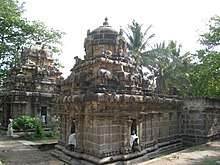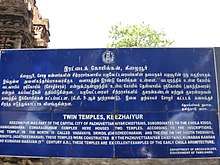Paluvettaraiyar
The Paluvettuvarayar were feudatories of the medieval Cholas. They ruled over the areas of Kila-Paluvur, Mela-Paluvur and Keezhaiyur in the Udaiyarpalayam taluk of the Tiruchirapalli district.[1] They were responsible for a number of benefactions to the temples at this place and were known to have been related to the Cholas by marriage.[2]
| Official language | Tamil |
| Family name | |
| Capital | Paluvur |

Origin
According to the Anbil plates of Sundara Chola, his paternal grandmother, that is the queen of Parantaka I and the mother of Arinjaya Chola was of Paluvettaraiyar family.[3] She is therein described as the daughter of a Chera mandala prince called Paluvettaraiyar. So it can be safely concluded that they were of Chera origin. However it is not clear if they were already in possession of the areas of Kilapaluvur, Melapaluvur and Keezhaiyur or if they were granted these dominions after their alliance with the Cholas.[2]
Reference in South Indian inscriptions

About a dozen records pertaining to this dynasty have been found. Paluvettaraiyar was a Kerala prince who figures largely in the inscriptions copied at Kila-paaluvur and Mela-paluvur in Tiruchirapalli district A.R. No. 231 of 1926 dated in te 12th year of Paranthaka. One of the records (A.R. No. 231 of 1926) dated in the 12th year of Parantaka, states that Paluvettaraiyar Kandan Amudanar fought, on behalf of his Chola overlord, a victorious battle at Vellur against the forces of the Pandya king and his Ceylonese ally, in which the Pandya lost his life. To commemorate this success the Commander Nakkan Sattan of Paradur made a gift of a perpetual lamp to the temple of Tiruvalandurai-Mahadeva at Siru-Paluvur.
It is perhaps this Amudanar who is referred to in the Anbil Plates of Sundara Chola as a Kerala prince whose daughter was married to Parantaka I and bore him prince Arinjaya. The term ‘Kerala prince’ probably meant that he was a relative of the Chera king.[4]
Other chiefs from this family include Kumaran Maravan and Kumaran Kandan.[5] They are credited with the building of the Twin Temples of Keezhaiyur, a 9th century temple complex.[6]
Paluvettaraiyar Regiment
The Paluvettaraiyar regiment was a military regiment maintained by the Paluvettaraiyar which was involved in the invasion of Sri Lanka by Cholas in the 10th century. The Paluvettaraiyar regiment was a military regiment maintained by the Mutharaja chief Paluvettaraiyar. It comprised both Muthuraja and Sengunthar Kaikola Mudaliar soldiers[7] in the regiment of Paluvettaraiyar and were involved in the invasion of Lanka by Cholas in the 10th century.[8][9]
References
- S. Swaminathan. The early Chōḷas history, art, and culture. Sharada Pub. House, 1998. p. 64.
- Bhulabhai Memorial Institute, Bombay. The Heritage of Indian Art Series. N.M. Tripathi Private., 1963. p. 29.
- S. Swaminathan. The early Chōḷas history, art, and culture. Sharada Pub. House, 1998. p. 78.
- "South Indian Inscriptions Volume 13". Archaeological Survey of India. Retrieved 2008-11-09.
- History of People and Their Environs: Essays in Honour of Prof. B.S. Chandrababu. Bharathi Puthakalayam, 2011 - Tamil Nadu (India) - 767 pages. p. 142.
- http://www.thehindu.com/news/national/tamil-nadu/9th-century-twin-temples-of-keezhaiyur-all-set-for-facelift/article7446286.ece
- Ramaswamy, V. (1985). Textiles and weavers in medieval South India. Oxford University Press. Retrieved 2015-04-05.
- Studies in Indian epigraphy, Volumes 26–27
- Historical perspectives of warfare in India: some morale and matérial determinants By Sri Nandan Prasad, Centre for Studies in Civilizations (Delhi, India)